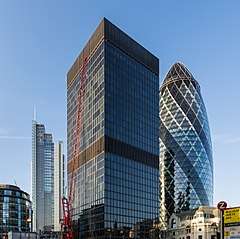Thomas Bignold
Thomas Bignold (1761–1835) was an English businessman. He was the founder of Norwich Union, now known as Aviva plc, one of the United Kingdom's largest insurance businesses.
Career
Born in Westerham, Kent, Thomas Bignold worked as an exciseman before moving to Norwich in the early 1780s.[1] He became a wine and spirit merchant in 1785.[2] In 1792 he was appointed secretary of the Norwich General Assurance Company.[1]
He left Norwich General Assurance in 1797 to found the Norwich Union Fire Insurance Society with support from local shopkeepers.[1] He appointed 500 local agents who helped him to expand the geographic coverage of the business; growth was also driven by his practice of offering profit sharing to fire insurance policy holders.[1] He went on to found the Norwich Union Life Insurance Society in 1808.[1]
After 1815 the post-war recession started to bite[3] and claims against the Society increased and he initially resisted many of those claims—some legitimately but some not so.[1] Eventually his sons collaborated with the other directors to force him to retire.[1]
In retirement he became increasing eccentric forming a business to make shoes with revolving heels: this venture pushed him into bankruptcy[4] and he eventually into prison.[1]
He was a churchwarden and freeman grocer. He died in 1835.[1]
Family
By 1785 he had married Sarah Long and together they went on to have three sons and three daughters.[1] His youngest son Samuel was his successor and later a Member of Parliament.[5]
References
- Thomas Bignold at Oxford Dictionary of National Biography
- Norwich since 1550 By Carole Rawcliffe, Richard Wilson, Christine Clark, Page 365
- Norwich since 1550 By Carole Rawcliffe, Richard Wilson, Christine Clark, Page 366
- New Reports of Cases Heard in the House of Lords, on Appeals and Writs of Error By Richard Bligh, Page 727
- Dod, Robert P. (1860). The Peerage, Baronetage and Knightage of Great Britain and Ireland. London: Whitaker and Co. p. 118.
